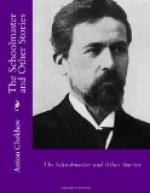When he got home Sysoev first of all looked at himself in the glass.
“Of course there was no need for me to blubber like that!” he thought, looking at his sunken cheeks and his eyes with dark rings under them. “My face is a much better colour to-day than yesterday. I am suffering from anemia and catarrh of the stomach, and my cough is only a stomach cough.”
Reassured, he slowly began undressing, and spent a long time brushing his new black suit, then carefully folded it up and put it in the chest of drawers.
Then he went up to the table where there lay a pile of his pupils’ exercise-books, and picking out Babkin’s, sat down and fell to contemplating the beautiful childish handwriting. . . .
And meantime, while he was examining the exercise-books, the district doctor was sitting in the next room and telling his wife in a whisper that a man ought not to have been allowed to go out to dinner who had not in all probability more than a week to live.
ENEMIES
Between nine and ten on a dark September evening the only son of the district doctor, Kirilov, a child of six, called Andrey, died of diphtheria. Just as the doctor’s wife sank on her knees by the dead child’s bedside and was overwhelmed by the first rush of despair there came a sharp ring at the bell in the entry.
All the servants had been sent out of the house that morning on account of the diphtheria. Kirilov went to open the door just as he was, without his coat on, with his waistcoat unbuttoned, without wiping his wet face or his hands which were scalded with carbolic. It was dark in the entry and nothing could be distinguished in the man who came in but medium height, a white scarf, and a large, extremely pale face, so pale that its entrance seemed to make the passage lighter.
“Is the doctor at home?” the newcomer asked quickly.
“I am at home,” answered Kirilov. “What do you want?”
“Oh, it’s you? I am very glad,” said the stranger in a tone of relief, and he began feeling in the dark for the doctor’s hand, found it and squeezed it tightly in his own. “I am very . . . very glad! We are acquainted. My name is Abogin, and I had the honour of meeting you in the summer at Gnutchev’s. I am very glad I have found you at home. For God’s sake don’t refuse to come back with me at once. . . . My wife has been taken dangerously ill. . . . And the carriage is waiting. . . .”
From the voice and gestures of the speaker it could be seen that he was in a state of great excitement. Like a man terrified by a house on fire or a mad dog, he could hardly restrain his rapid breathing and spoke quickly in a shaking voice, and there was a note of unaffected sincerity and childish alarm in his voice. As people always do who are frightened and overwhelmed, he spoke in brief, jerky sentences and uttered a great many unnecessary, irrelevant words.




